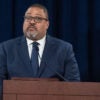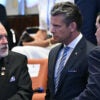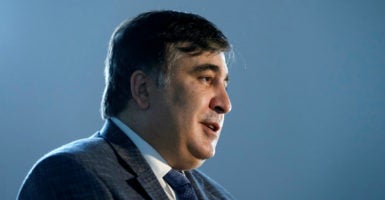KYIV, Ukraine—Mikheil Saakashvili sits at a desk devoid of any photos or personal memorabilia.
On this day, the 48-year-old former Georgian president has only been on the job for four days as leader of a startup Ukrainian opposition political party called Wave.
This is the next chapter of Saakashvili’s anti-corruption crusade following his resignation as governor of Ukraine’s Odesa Oblast on Nov. 7 in protest of widespread corruption among Ukrainian officials.
Now, he hopes to harness a global anti-establishment movement, which he thinks helped Donald Trump win the White House. The sometimes controversial Saakashvili aims to rid Ukraine of corruption by installing a new generation of politicians who will set the country on an irreversible path to escape Russian influence.
“Every time a revolution happens, people have a right to expect revolutionary changes.” —@SaakashviliM
“We had a revolution with lots of casualties,” he told The Daily Signal during an interview. “And every time a revolution happens, people have a right to expect revolutionary changes.”
Saakashvili leaned back and stroked the lapel of his striped blue blazer as he spoke English fluently and flawlessly, in a casual, but emphatic, manner. (He also speaks Georgian, Ukrainian, French, and Russian.)
In a one-on-one interview, the onetime Georgian president’s replies are measured, focused, bordering on scripted—often coming before the question has ended.
“Why should Americans care about what happens in Ukraine?” this correspondent asked.
Without missing a beat, Saakashvili replied: “Because Ukraine’s story is about the same ideas that Americans traditionally stand up for. It’s about freedom, self-government by the people … everything that America stands for is also here in Ukraine.”
He added: “And to send a signal that America is helping Ukraine to defend itself by giving weapons. To help Ukraine defend itself, that’s a very American idea.”
Falling Out
Ukrainian President Petro Poroshenko granted Saakashvili Ukrainian citizenship in 2015 and appointed him governor of the Odesa Oblast, which comprises the Black Sea port city of Odesa—Ukraine’s most important shipping hub.
Poroshenko, ostensibly, brought Saakashvili in to shake things up as part of a nationwide push to root out corruption in the wake of Ukraine’s pro-Western 2014 revolution.
But Saakashvili said he was quickly frustrated by what he claimed to be stonewalling by Poroshenko and the majority of Ukraine’s political class in implementing anti-corruption reforms.
“The first year, year and a half after the revolution, you had a sense that something was moving,” he said. “Now Ukrainians think the revolution failed, that’s the problem.”
Saakashvili said he no longer has confidence in Poroshenko’s leadership.
“He tried to have it both ways,” Saakashvili said of the Ukrainian president. “The reforms have turned into an imitation of reforms.”
On Nov. 11, four days after quitting his post in Odesa, Saakashvili announced at a press conference the creation of a new Ukrainian political party focused on rooting out corruption and elevating a younger generation to power.
“I have huge confidence in the new, younger Ukrainian generation,” Saakashvili said. “They’re amazing. Ukraine has huge potential to become a real European superpower.”
At that same press event, Saakashvili called for early parliamentary elections. It was a controversial move; spurring accusations it would play into Russian efforts to subvert Ukraine’s political process.
During a Nov. 11 press conference in Kyiv (the same day Saakashvili called for early elections) the head of the Security Service of Ukraine said authorities had evidence of a Russian plot to bring about “early parliamentary elections in our country in order to bring pro-Russian forces to power, exclusively with a view to revise the European course and change the foreign policy vector of our state.”
Justifying his call for early elections, Saakashvili said Ukraine is teetering on another revolution, or possibly even a coup, and early elections are a last-ditch chance to prove to the Ukrainian electorate that real change is still possible at the ballot box.
“We are running against the clock to prevent chaos,” Saakashvili told The Daily Signal, defending early elections.
He added: “Either you have an armed takeover, or some sort of armed chaos, or you have a restoration of old regime, or you have some sort of democratic transformation with fast reforms. And right now I would say, as it looks, chaos and armed insurrection is much more likely than the other two scenarios. And that’s what’s worrying me a lot.”
Fresh Faces
Saakashvili led Georgia through a devastating war with Russia in 2008, earning him the ire of Russian President Vladimir Putin, as well as critics in Georgia for his conduct of the war.
He took a hard line against organized crime and corruption as president. Many in the West praised his efforts (including Trump, who called Saakashvili a model reformer in 2012), but he also met resistance from much of the old guard in Georgia.
Saakashvili’s rough and tumble style, and penchant for not mincing words, has also earned him pushback in his adoptive Ukraine.
So far, the war has killed about 10,000 Ukrainians and displaced approximately 1.7 million people.
Saakashvili brushed off his critics. He said the best way to inspire Ukrainians to believe that real change is possible through the democratic process—not just through a revolving door of revolutions—is to bring in an entirely fresh crop of politicians with no ties to the former regime, big business, or Russia.
“They got rid of the Soviet monuments, now they need to get rid of the Soviet psyche,” Saakashvili said, adding:
Ukraine’s national political elite is very much like the Russian ones. They live in the same huge mansions, they have the same lifestyles, they have the same idea of a state that is basically a milking cow that you have to capitalize on. So, for me, for Ukraine to really get out of the orbit of Russia is also to get rid of the old Russian-style elite.
The Next Generation
It is after 6 p.m. on a Tuesday at the downtown Kyiv offices of Wave—Saakashvili’s freshly minted opposition party.
In the center workspace, a team of millennials tap away on Apple laptops, working the social media grapevines. Its goal is to utilize social media to recruit a new generation of Ukrainian lawmakers and political leaders.
The intent of the party is to bring “entirely new people” into Ukraine’s government. The rules for party leadership include no more than one term served in parliament, and no ties to big business.
The office space has the feel of a startup. Window alcoves are filled with bean bag chairs, the furniture is hip and modern.
The staffers, many in their mid or early 20s, munch on takeout dinner from Puzata Hata (a fast-food chain of traditional Ukrainian food). Some quietly chat; others have headphones in their ears.
Interacting with the young people under his command, Saakashvili seems like a university professor leading his students through a workshop rather than a former wartime president leading a hard-charging, political crusade to erode a quarter-century of corrupted government.
“We already have a critical mass of mostly young people who came to Ukrainian government after the second Maidan,” Saakashvili said, referring to the 2014 revolution.
He added:
They serve as deputy ministers, deputy governors, as heads of districts, as heads of agencies, and some members of parliament that already some taste of governing and they have huge frustration because they were not given the instruments to really make a change.
They know how big change would look if they had been given the instruments to make it happen. And then we should elevate them from the status of troublemakers to decision makers.
Yet, despite the trappings of banality in this office space, reminders of what is at stake for Ukraine are ubiquitous—including the view out the windows, which overlook European Square, a scene of some of the worst violence during Ukraine’s 2014 revolution.
Chalk outlines of bodies are on the nearby sidewalks, marking where protesters were killed by the notorious, since disbanded, riot police known as the Berkut.
On this night, Kyiv is uncharacteristically on edge. Authorities shut down the capital city’s main thoroughfare, Khreshchatyk, due to reports of planned protests, which authorities claimed were part of a Russian plot to destabilize Ukraine.
“Is this the Maidan part III?” one university student from Kyiv wrote on her Facebook page, alluding to the 2004 Orange Revolution and the 2014 Revolution of Dignity, as it is now called—both of which orbited around protests on the Maidan, Kyiv’s central square.
The temperatures outside are sub-freezing. In front of a nearby Niketown store on Khreshchatyk, about a dozen riot police are huddled in their thick winter coats. They also wear body armor, wield batons, and have balaclavas rolled up on their heads as beanies.
Unfazed pedestrians shuffle past, walking gingerly over ice-covered ground.
Small squads of riot police—some in all black, some in drab green—patrol the Maidan, weaving through the crowds.
There is an ominous feel about the capital. An almost palpable buildup of tension, like an electric current about to arc.
Not for Nothing
Many Ukrainians whisper about the possibility of another revolution. However, the prevailing opinion remains that another uprising isn’t yet possible; years of war and the trauma of 2014 have drained the energy needed for a popular movement on the scale of what happened in the winter of 2013 to 2014.
Asked if the 2014 revolution failed, Saakashvili replied: “The second Maidan didn’t go for nothing. It produced this layer of young Ukrainians that are willing to take over, and that are ready to take over. And they are the ones we should put forward.”
But Ukrainians’ frustrations toward their government are mounting. Polls indicate abysmal levels of trust in elected leaders.
Many Ukrainian politicians in power today were in power before the revolution. And anti-corruption initiatives such as a recent online database for politicians to declare their personal assets have done little more than highlight for the Ukrainian people—whose average annual salary is $3,178—the extravagant lifestyle enjoyed by the country’s political elite.
“We made a step forward, but we stepped into very bad substance,” Saakashvili said, referring to the e-declarations.
In the eastern part of the country, a stagnant, static trench war continues. Casualties—civilian and military, and on both sides—continue to mount despite the February 2015 cease-fire.
So far, the war has killed about 10,000 Ukrainians and displaced approximately 1.7 million people, according to the U.N. and other international aid groups.
Some Ukrainians say the war in the east is the glue holding the country together. Without the unifying effect of a common Russian enemy and rallying around the war effort, they claim attention would once again focus on rooting out the entrenched political elite in Kyiv.
“If the soldiers look too heroic, then the soldiers will ask for their share of the political decision-making process,” Saakashvili said.
Breaking Ranks
There is a pervasive undertone of distrust in elected officials among Ukraine’s military rank and file. Many soldiers on the front lines express disappointment in their elected leaders and openly question their judgment.
“Those soldiers are basically rotting in the trenches. I’ve been there many times,” Saakashvili said. “They don’t have toilets, they don’t have running water, obviously. For all these years that they are there, they don’t have proper laundry, they don’t even have radios in most of the positions.”
“They were talking to me very critically about the president and the whole power structure,” Saakashvili said.
Yet, for now, the Russian threat takes precedence. The overwhelming majority of Ukrainian soldiers say they’re fighting to hold back a Russian invasion, and that if they turned their back on the enemy it would invite a full-on offensive to cleave Ukraine in two.
The soldiers don’t question the overall justice of the war itself so much as the manner in which it is fought.
Most soldiers are more frustrated by their inability to attack and take back ground, which they consider to be sovereign Ukrainian territory. They yearn to put an end to the static trench warfare that has done little but fill body bags and raze villages.
“We don’t know if Ukraine will exist as a state if it doesn’t start to grow.”
—@SaakashviliM
Saakashvili said time is running out for Ukraine’s lawmakers to effect significant reforms before Ukrainians’—especially combat veterans from the war in the Donbas—disappointment in their government boils over again into widespread unrest.
“We have hundreds of thousands of armed people running around the country, hating the system, hating the government,” Saakashvili said.
“They are bitter, and they hate the status quo,” Saakashvili said. “And they are not asking for elections, they are asking for change. And for them, the easiest way to change is through weapons.”
In a June interview, then-U.S. Ambassador to Ukraine Geoffrey Pyatt told The Daily Signal that 2016 was the year that Ukraine’s post-revolution, pro-Western pivot became “irreversible.”
“I would be glad to agree, but it’s not so easy,” Saakashvili said in response to Pyatt’s assessment.
Saakashvili said double-digit gross domestic product growth is needed before Ukraine’s progress becomes irreversible.
“We don’t know if Ukraine will exist as a state if it doesn’t start to grow,” Saakashvili said.
The Forever War
“Ukraine has gained the military upper hand over Russia,” Saakashvili said. “Why? Because Russia couldn’t realize any of its military goals.”
While Ukraine is still significantly outgunned by Russia’s military, the country has made exponential progress in building up its military.
The country’s military ranks have swollen by more than 25 percent since 2014—growing from 200,000 to 250,000 troops. Defense spending went up by 23 percent during the first year of the war, and is on track to keep going up by about 10 percent annually.
The ultimate aim of Ukraine’s rearmament, according to official doctrine, is the capacity to turn back a full-scale Russian invasion.
“He [Putin] didn’t use nuclear weapons because the world wouldn’t have accepted it,” Saakashvili said. “But he used his artillery, he used all his combat-ready troops, he used everything. He used subversion. He used hybrid war. So he basically failed. And so Ukraine has already gained military victory.”
Ukraine has no stated ambition to ultimately challenge Russia for regional influence, but the country considers itself a bulwark against Russian military adventures deeper into Europe.
“Ukraine has contained Russia on the borders of Europe,” Saakashvili said, adding:
The Russians couldn’t take the entire Donbas, which was Putin’s goal, obviously. Russia couldn’t destroy the front line, which was his goal. His goal was to destroy the front line and send panicking, dispersed troops chaotically to Kyiv. He couldn’t take the south of Ukraine to separate Ukraine from the sea and take all the line toward the European Union and toward Moldova. Those were his goals. At a minimum he wanted to take Mariupol, to get access to Crimea. He couldn’t realize any of these goals.
Ukraine may have defied its doubters on the battlefield, but the country could have a more difficult task ahead in defending itself from the Kremlin’s covert efforts to scuttle Ukraine’s government from within.
“Now Russia will sit on the fences and wait for Ukraine to destroy itself. That’s exactly what we shall not allow,” Saakashvili said.
Many in Ukraine are worried about Russia getting its way in cease-fire negotiations.
The stalemate in eastern Ukraine boils down to Ukraine demanding certain “red lines” are met before any political settlement with the two separatist regions is reached.
Those red lines include full control of its borders with Russia on the periphery of the two breakaway separatist republics, and the pullout of all Russian troops and military advisers from Ukraine.
Moscow says the priority—even before the fighting ends—is for Kyiv to hold local elections in the east, amend the national constitution to grant the separatist territories more autonomy, and for the two separatist territories to have a seat in Ukraine’s parliament.
Birds of a Feather
Saakashvili said he has a personal relationship with Trump, which dates back to 1995.
“We are friends,” Saakashvili said. “He [Trump] is a very complex personality, he is not the caricature that the media makes him out to be.”
In a 2012 interview on “Fox & Friends,” Trump praised Saakashvili, who was president of Georgia at the time.
“He’s one of the great leaders of the world right now,” Trump said. “And literally other countries, major countries, are going there to find out what he’s doing.”
“He called me one of the best leaders of the world, because Georgia was one of the world’s best stories of change,” Saakashvili said of Trump. “He’s interested in success stories … so he’ll be looking for success stories. And he hates losers. That’s a challenge for Ukraine, because Ukraine right now looks like a loser.”
Today, Saakashvili considers his personal relationship with the incoming U.S. president to be a political asset, especially as Ukraine maneuvers to maintain Western sanctions against Russia and lobby the U.S. for lethal weapons.
When asked if Trump’s anti-establishment campaign rallying cry of “drain the swamp” also resonates in Ukraine, Saakashvili said: “For sure it resonates in Ukraine. I think it resonates worldwide right now, but in Ukraine especially. In Ukraine, all the elites are so rotten, the media isn’t trusted, the whole establishment does not have the confidence of the people.”
Saakashvili said he was not interested in the presidency of Ukraine (due to constitutional restrictions), but he was open to the job of prime minister.
When asked what his ultimate vision of success looked like, Saakashvili pointed out the glass window of his office toward the young people on their laptops and bean bag chairs.
“To bring a new generation into Ukrainian government,” he replied. “I want to change the entire political class.”































